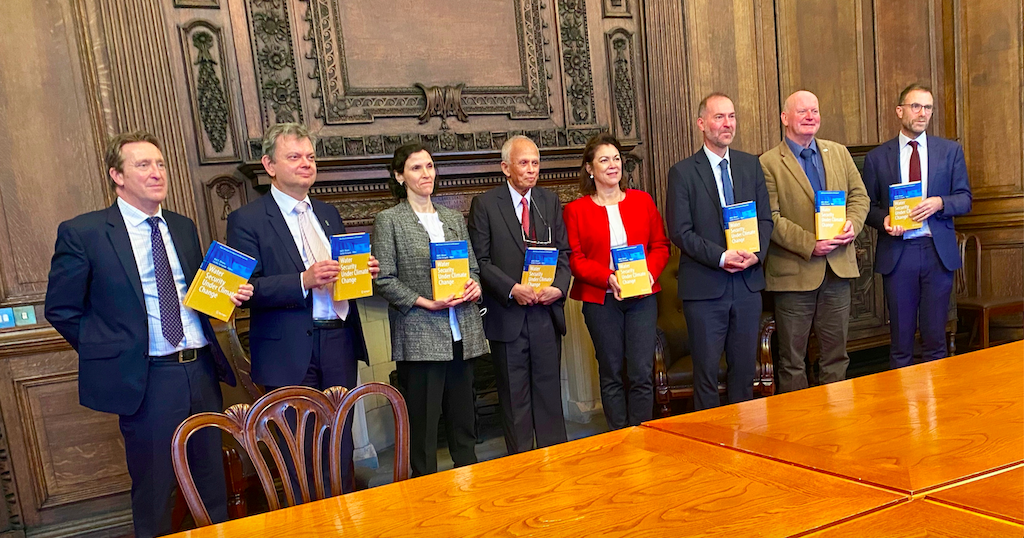Report And Video: Water Security Under Climate Change
High Level Forum Meets In Advance Of COP26
31 Oct 2021 by The Water Diplomat
GLASGOW, United Kingdom

On the eve of COP26, Ministers, heads of international organisations, leading figures from public and private sectors, eminent academics from different parts of the world and from different disciplines, gathered to discuss water security challenges under climate change.
On 28 and 29 October, Prof. Asit K. Biswas and Prof. Cecilia Tortajada hosted this High-level Forum with the support of the University of Glasgow and the Scottish Government.
The central theme of the meeting was water security, which features more prominently in recent high-level reports on natural disasters, humanitarian emergencies, sustainable development and peacebuilding.
Recorded video footage of the live-streamed occasion is viewable at the following links:
INTRODUCTORY SESSION - Thursday 28 October
- Thursday 28 October - Proceedings
- Friday 29 October - Proceedings
The majority of speakers contributed papers. These have just been published by Springer Nature as a book: Water Security under Climate Change (https://link.springer.com/book/10.1007%2F978-981-16-5493-0).
Dr Tobias Schmitz reports on the High-level Forum for "The Water Diplomat" and The water Diplomat:
The energising forum included interventions from Inger Andersen Under-Secretary General of the United Nations; Scottish Cabinet Secretary for Net Zero, Energy and Transport, Michael Matheson; heads of international organisations; leading water experts from public and private sectors, and eminent international academics.
A series of views from Scotland underlined the centrality of water in the development of Glasgow as a city, and overall Scottish national policy. The Scotland, Hydro Nation program approach seeks to husband, manage and develops all of the country's water resources responsibly, and sustainably, regardless of how plentiful they are, consistent with the view that Scotland should act as a “Good Global Citizen”.
Glasgow City Council Leader Susan Aitken described Glasgow's journey from cradle of industrialisation to model for sustainable urban development, Glasgow is investing substantial resources to transition towards a green city and turn the attention back to protecting the river Clyde around which social and economic development has taken place since the 13th century.
Scotland has committed itself to responsible management of water resources and a low carbon future through evidence-based decision making in close cooperation with knowledge institutions, the environmental protection agency, the regulator, and industry. It has placed a legal duty on ministers to ensure water security and was one of the first countries to declare a climate emergency and endorse the Paris declaration.
Inger Andersen, executive director of UNEP and UN Under-Secretary General of the United Nations, underlined that existing pre-COP26 climate commitments fall short of what is needed and limit the world to a 2.7 degree temperature rise. With net zero pledges included, it is possible to halt temperature rise at 2.2 degrees, but that would already lock in extensive need for adaptation measures, particularly on the water cycle.
Andersen pointed out that UNEP has identified water crises as among the top global risks currently and reiterated the words of UN Secretary General Antonio Guterres that climate change acts as a crisis multiplier.
Other interventions from international institutions highlighted key vulnerabilities but also pointed to water as a source of solutions. Gabriel Eckstein from the International Water Resources Association argued that water security is sorely missing from the climate debate, pointing out that freshwater is actually the face of climate change and it is also where to look for solutions both in the area of adaptation and in the field of mitigation.
David Molden, former Director of the International Centre for Integrated Mountain Development (ICIMOD) highlighted the ten major Asian river basins dependent on the Hindu Kush Himalaya freshwater towers that are glacier and snow dependent and ultimately affect the livelihoods on up to one third of the world’s population.
Debra Tan from China Water Risk echoed this vulnerability in economic terms, estimating that some $4.3 Trillion USD of GDP and associated assets are located in areas with high water stress and coastal risk.
Dr Mohamed Abdel-Aty, Egyptian Minister of Water Resources reminded the forum that large volumes of finance must be mobilised to respond to water stress and improve water quality, rationalise water use, develop water resources and develop the enabling environment.
Oyun Sanjaasureen from the Green Climate Fund highlighted the rapid growth of its current portfolio to $37 Billion USD in 140 countries which increasingly include water related projects either in the field of climate resilient water sanitation and hygiene and integrated water resources management, confirming the increased attention for water security under climate change.
Recorded video footage of the live-streamed occasion is viewable at the following links:
INTRODUCTORY SESSION - Thursday 28 October
- Thursday 28 October - Proceedings
- Friday 29 October - Proceedings
Related Topics
12 May 2021 GLASGOW, United Kingdom
Even developed countries will find it difficult to meet their Sustainable Development Goals by 2030. Guest article by Professor Asit Biswas and Professor Cecilia Tortajada.
